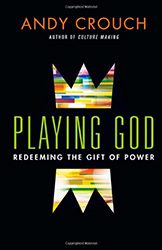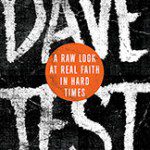 Andy Crouch has a lot to say and brings good street “cred” in saying it. He recently became executive editor at Christianity Today. He’s a senior fellow at the International Justice Mission’s IJM Institute. He’s on the governing board at both Fuller Theological Seminary and the John Templeton Foundation. He authored Culture Making: Recovering Our Creative Calling. He also served a stint on the staff of InterVarsity Christian Fellowship. He brings the broad view one only gets from climbing to a high place, having some real sense of the vast scope both of human brokenness, suffering and need and the astounding abundance and variety of resources and people making up God’s Kingdom.
Andy Crouch has a lot to say and brings good street “cred” in saying it. He recently became executive editor at Christianity Today. He’s a senior fellow at the International Justice Mission’s IJM Institute. He’s on the governing board at both Fuller Theological Seminary and the John Templeton Foundation. He authored Culture Making: Recovering Our Creative Calling. He also served a stint on the staff of InterVarsity Christian Fellowship. He brings the broad view one only gets from climbing to a high place, having some real sense of the vast scope both of human brokenness, suffering and need and the astounding abundance and variety of resources and people making up God’s Kingdom.
So what’s he up to now? Power. Finding himself niched into all these impressive groups and organizations, Andy certainly might look like he’s should know something about power. And that’s the mild surprise of Playing God: Redeeming the Gift of Power. Andy wants to impress upon us that we all wield some degree of power if we rightly understood it. And, therefore, that it can be abused or used expansively and creatively. Playing God does three things very well. First, Andy writes with intellectual vigor on the whole subject of power; he makes no apology for engaging our thought. The reader bumps into names probably strange to many but Andy boils them down nicely for the newbie so the reader doesn’t get bogged down and bail before he can develop his own good points. He dances with Friedrich Nietzsche but doesn’t let him lead.
Second, Andy presses the discussion of power into the clay of everyday life. While he openly champions the possibility of institutions using power justly, even beneficently, he also takes us along for a hot summer train ride in India to see one man whose earthly accomplishments (and they are significant) serve as conduit enabling power (God’s power and earthly forms as well) to redeem both individuals and systems enslaving children to lifelong hard labor. God’s power, Andy might say, not only redeems but marshals all forms of the world’s power bringing them into sharp focus and significant effect.
We also see him learning to play the cello in middle age. He strives to practice an hour a day. (Keep that left thumb down, Andy, or it will throw your intonation off.) This impressed me. Why? To pound the stuffing out of Yo Yo Ma in a cutting contest at some late night session in a club? No, as his family already has three string players, he wants to round out a string quartet to simply enjoy the communication and interaction with them as both family and as musicians. Even at the expense of being the only croaker in the bunch. So he saws happily away like a doctor in a Civil War field hospital.
Finally, he turns the whole discussion of power on its head from what most expect. Andy says that, as he wrote this, people kept throwing out the old “absolute power corrupts absolutely.” Most people’s initial reaction to “power” in any context would be that it’s something to be utilized at great risk and almost always goes bad. This is part of the truth. While the book deals with potential evils of the abuse of power (how could it not?), Playing God not only deals with the potential for good latent in power of all kinds but makes the case through a panoramic overview of Scripture that power not only was good in its origins but is redeemed to new depths in Christ which expand up to and through His establishing His Kingdom at His return.
For example, in Genesis 1, when God says, “Let there be…”, the nature of the voice in the ancient language is a soft command releasing great power with both precision and delicacy. Andy writes, “ ‘Let there be…’ does not have to assert power, it assumes it. It does not have to impose power, it indwells it.” When the Spirit of God broods or hovers over the face of the waters in Genesis 1:2, it’s more like a sculptor asking himself where to make the first cut in virgin marble or a painter surveying a clean canvas for the first brush stroke. It’s power that creates abundance that’s alive, swarming, teeming on the fifth day. And most important, it’s power that empowers others enabling them to flourish. Adam wasn’t just a janitor in a museum; he was given dominion over the earth. God’s power, and Crouch argues that all legitimate forms of power used legitimately, justly, even graciously in time and space, has the same effect. Chewing thoughtfully on this first chapter of the book could change the way we see all of Scripture. He also points out that at a strategic moment in history, two people flourishing under God’s power offer their own “Let it be…” back to God as Mary (Luke 1:38) and Jesus (Luke 22:42) play their part in restoring “true image bearing, true flourishing and true power was restored.”
Another really good discussion in the book comes discussing the world’s typical view of power (the rise of the mightiest) as described in western movies where the most powerful wins whether they’re good or not. Think Clint Eastwood (although Andy does not mention him). The westerns Andy cites aren’t recent but ones going back before television. Going back decades, the message that “might wins” has lain deeply and subliminally embedded in multiple layers of culture shaping generations of people for decades. This shapes the discussion as we discuss and work for things with our neighbors like justice. He says we can’t just agree with everyone on the lowest common denominator of “justice” that all might accept. The follower of Jesus foundationally moves with a view of power light years removed from the view that commonly underlies most of what goes on in the common public square.
His discussions on the interruptible and improvisational lifestyle of Jesus as well as Sabbath implications are also choice but I encourage you to read them yourself. I know I will read them again. Playing God does what Andy Crouch describes God’s power doing; it imparts to others so that they flourish without diminishing the power of the original source. His thinking, I’m sure, will spawn other books (also to be reviewed here so stay tuned). He sensitizes the reader to the unique touch of God who “keeps His thumb down” so that He never goes off key in the lives of those He touches and uses. And that’s power that stretches our own limp strings into tightness that sings.
For more conversation on “Playing God,” visit the Patheos Book Club here.













